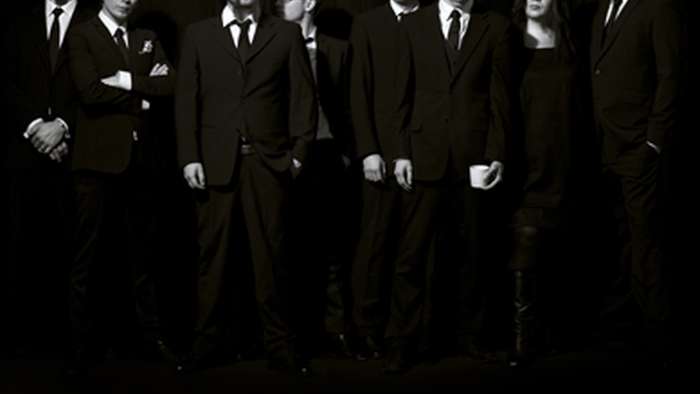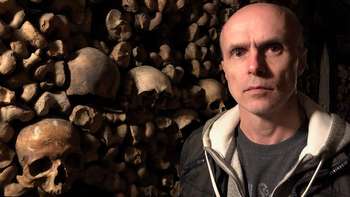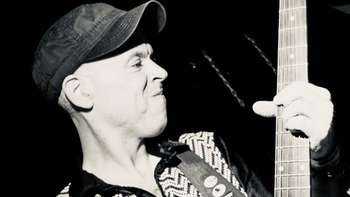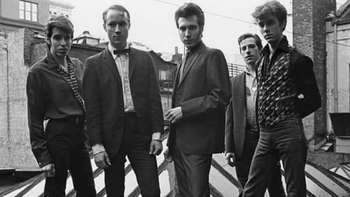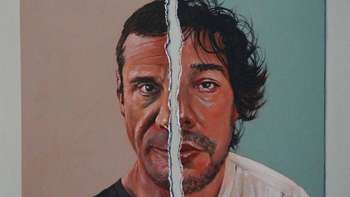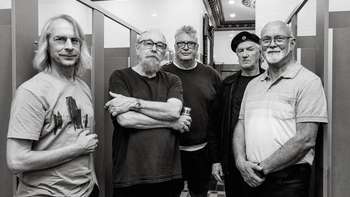
If you happened to read our review of Diablo Swing Orchestra's Pandora's Piñata, then you'll know that we here at SPB think pretty highly of the swinging metalheads out of Sweden. That's why one of our writers jumped at the chance to send a few questions to the band. The verbose bassist of DSO Anders Johansson was more than kind enough to answer a few of our questions.
Scene Point Blank: First of all, thank you very much for your time, and congratulations on the release of Pandora's Piñata! I don't think it's a stretch to say the album's had literally universal praise, including here at Scene Point Blank where it received a 9.5 out of 10. How has the band felt about this incredibly warm reception?
Anders Johansson: Thank you, indeed, for having us! The expression ”universal praise” truly makes me blush over here in modest Sweden, though. However, please watch us bow and curtsey most humbly for that nine-point-five. We are locked in awe over all those high marks across the boards out there. To be totally honest, aside from the highest ones, we praise the lowest grades too, since they tend to contain superlatives and their entertaining counterparts, which in turn usually make for a good read. However, nowadays, we seem to have made do with the all good ones alone.
What happened there? I guess there's something in this piñata appealing to everyone somehow, huh? The in-betweens, on the other hand, tend to be kind of vague and boring. Hence, they seldom interest us much. We're not less grateful for them though. That being said, we are indeed eagerly awaiting all the grand negative ones popping up. The writers of those usually use word-crayons like none other!
Scene Point Blank: Pandora's Piñata is your first album to feature a brass section as part of the full-time band. How has that changed the dynamic of the pieces from your first two albums? Has it provided you with any new areas to explore musically that were previously untenable, or have they mostly been augmenting a similar type of songwriting? Are there any other instruments you wish you could write for or could be included in the band's line-up?
Anders Johansson: With Daniel Hedin (trombone) and Martin Isaksson (trumpet) finally added as full-time members since a couple of years back, we've not only abounded into a dynamically larger apparatus these days, being able to accommodate horns in a much more integrated way while composing. We're also in the process of merging as components of a group, into some kind of creative alloy, if you will. This is truly noticeable on the latest album, as you may have noticed. You can really hear the result of the eight of us being more present throughout the whole process of writing this time, with the aftermath of us being more glued together as both friends and fellow musicians. The latter as opposed to in the beginning, that is. For example, we're way better at rehearsing our songs before we enter the studio. I guess experiences of mutual highs and lows throughout the years tend to do that to you as a group, right? We simply know the songs by heart at the end of the pre-studio phase these days and there is well crafted pre-production material to fall back on, in case of issues presenting themselves while recording. This makes the recording process a much smoother one which, of course, also may be heard audio-wise. I mean, that base helps everything from the producer to any possible additional musicians entering our recording sphere. Also, before, a lot of songs came out sounding like the brass was added on top of everything else, as opposed to these latest eleven songs, where trumpets, trombones, strings, and woodwinds really blend into the mix, broadening the composition in its totality instead of just being the salt and pepper on the surface. So, yes, we are indeed a larger group of creative folks these days, but also a tighter unit at that, in a lot of ways.
Regarding the part-question on other instruments, I can only answer for myself, and since I'm very much into vintage Latin sounds, and Colombian/Brazilian ones in particular, I'd be thrilled to see some percussion instruments such as the cuíca, agogo, or berimbau in there. Aside from that, I lately stumbled upon a Swiss drum phenomenon called The Hang. Those would make a beautiful addition to some still unwritten pieces too. Lastly on that note, having witnessed the Norwegian band Katzenjammer on stage featuring a giant balalaika with a smug smiling cat, that definitely needs some further exploring too!
Scene Point Blank: Speaking of which, you've never been a purely “swing” band—Pandora's Piñata had definite elements of other genres, like opera, spaghetti western music, and electronic music. What other genres do you see yourselves exploring in the future? Are you worried about the premise of the band ever becoming stale?
Anders Johansson: I'm gonna start off by some real deep digging here. Beyond the conditioning of our minds, and its assumptions – and furthermore boredom as a consequence – there is a vast, non-judgemental openness. That's the place where the arts are best experienced, I'd say. Before I lose ya'll into that void, I want to sum it up in short: that openness keeps you attentive and appreciating. Since all members of the orchestra enjoy that space, it was easy for us to translate that attentiveness into finding those being like-minded. We all come from rather different disciplines and we all constitute various musical backgrounds. Something surely happens as a result when you blend all that. Everything from baritone metal swish-swosh and mariachi hooks, all the way to spaghetti western crescendos, as you've noted, and they all definitely fall into place too. I personally believe our wide spread constitutes the very essence of Diablo Swing, and that this, in turn, bubbles up into a somewhat boiling häxblandning of musical crayons, indeed, pardon my Swedish. That being said, I do believe the term “stale” is of another vocabulary than that of Diablo Swing.
Regarding future matters, I myself truly feel ourselves exploring the Latin areas of music further. Partly because we're widely influenced from touring those countries, but also because we all seem to have those progressions built into our Swedish longing for places and experiences far, far away.

Scene Point Blank: Is there anything else you learned from your first two releases that contributed to the writing of Pandora's Piñata? How has the band changed and grown since The Butcher's Ballroom six years ago?
Anders Johansson: This being our third full album, we've had some serious practicing in the matter over the last nine years, and I'd say that this time around we're, again, a more of a homogeneous gathering of folks. Both regarding how we sound, as well as how we work as individuals in a group, both inside and outside of the studio environment. As you may have gathered by now, all of us are contributing more to the overall result these days, as opposed to the process of The Butcher’s Ballroom, for instance, in which Daniel Håkansson did most of the composing. A whole lot has changed since then, though some things seem to stay the same too. Pontus [Mantefors] was already co-producing during our 2005 recordings, which still is the same for today’s process.
Everyone of us chipping in like that is truly noticeable on the finished result, being as vivid as I’d like to say it is. Again, the various personalities of the band represented, as well as our musical backgrounds being of such a wide spread. It’s all there and audible. That spread is also what I’ve tried to convey using all those colours while art directing and drawing the latest album art work. We’re simply not just red and black anymore. A whole lot of scatterings and hues in there today, in a lot of different ways, wouldn’t you agree?
Lastly, the most important lesson we've learned throughout the years is that growing is definitely all about integration, as opposed to excluding what you, per definition, see as ”not you.” Allowing is key, and our forgiving way of using a wide range of elements in our music, truly is the living proof of that.
Scene Point Blank: Normally it's very trite to ask about influences in an interview, but given the insane stylistic diversity of your music, we're hoping you'll forgive us. Could you humour us and tell us what music you're being influenced by while you're writing?
Anders Johansson: The answers above also apply here and, along with those, since we've come to communicate quite closely with our listeners during the last few years, we've based a lot of the lyrical content on the mix of our own, and other people's own stories regarding relationships, individuality, as well as society and its possibilities and discontents. We're all very alike as humans, and these topics can't be aired enough, really. Also, the band unity described in answers above, was in itself a great influence for Pandora's Piñata being produced the way it was.
Also, as you probably know, music is a great way to defuse the seriousness of everyday life, and what better way of doing so, than through a blend of styles keeping listeners alert for every upcoming move? Just as for the case of many of our influences, you never know what to expect next. Depending on who in the band you ask, you'd get a different answer, of course. If I would give an honest shot at this, those artists would range from your typical 1920s: Benny Goodman ”Sing-Sing-Sing-Swing,” the guitar-based jams of Django Reinhardt, to Disney soundtracks buried in time, Swedish old school lullabies, vintage Latin grooves, and modern day equals to all of the above. The list could be made into a long one…
Certain songs have, however, been of certain importance to the band, such as ”Les Triplettes de Belleville.” There's something about that one indeed, not to mention the song we entered the stage to during our last Latin American tour — Disney's ”Pink Elephants On Parade,” as seen in the movie Dumbo from 1941. And there's plenty more where that came from. For instance, I'd surely like doing something on the Disney short ”The Skeleton Dance” from 1929. Those vintage animations seem to be a somewhat bottomless influential pit for us. Coming back to the wider sense of influences once again, this time contemporary ones: alternative hard rock must be added here, of course. The latter constituting bands like Djerv, Tool, Porcupine Tree, Stolen Babies, Opeth, Muse, Primus, and Mr. Mike Patton's projects among many others. On that matter, I myself feel drawn to performing (to say the least) a cover of the Muse song ”Knights Of Cydonia.” Daniel Håkansson does a mean Matt Bellamy! Also, as an example of modern day versions of the 1920s musical glory, the band Katzenjammer would definitely be it. Again, the use of that huge balalaika with the smug smiling cat on it alone. I mean, what's not to like? Music can, and should be, an audio/visual experience like that, right?
Scene Point Blank: Are there any bands or musicians today you feel are really pushing musical boundaries as much as you are?
Anders Johansson: Aside from the bands listed in the answer above, and again, I can only answer for myself here, and I really must emphasise Mikael Åkerfeldt from Opeth and Steven Wilson from Porcupine Tree as constantly exploring the progressive borders (and the lack there-of). Also, since I'm delving into Latin progression right now, the DJ and producer Will “Quantic” Holland surely pushes the envelope in the mix of contemporary nu-jazz dubs, blended with vintage heritage Colombian cumbia, boogaloo and hiphop. Holland resides in Cali, Colombia, and is working on site with an amazing setup of renowned musicians from various genres that almost seem forgotten to the contemporary world. I recently heard his latest project Ondatrópica performing a Black Sabbath cover, “I Ron Man.” The pun alone! Holland's collaboration with Colombian heritage singer Nidia Góngora will definitely keep my toes dancing through the fall. There sure lies a little something-something in the broadening of musical horizons through the blending of styles. This does require the letting go of the regular definitions of what to like and not, though. Otherwise the door remains a closed one indeed...
Scene Point Blank: You toured through Latin America this year—any chance you'll be in the States or Europe? At least one of our writers is prepared to do a sales pitch to get you to come through the tiny state Vermont.
Anders Johansson: Unfortunately we won't be touring the US during 2012, since we weren't able to fit that into our Latin America schedule this time, and the paperwork for playing the US sure is an exercise in itself. One has to have the inside scoop early on to do all the proper planning for such a tour. However, it looks like we'll be able to visit those much longed for states during 2013. Maybe along with another South America and Mexico visit, and then stay a bit longer than we did this year. Now, that would truly be something, so please have that Vermont sales pitch ready! Regarding Europe, we'll soon play our first show here in a couple of years. We're actually heading to the highly acclaimed metal festival Wacken Open Air in just two weeks, and that particular festival experience sure is a much longed-for one to us, I must admit. I'm sure we can work a few wonders down there too, being really worked up post the Latin American tour.
Scene Point Blank: The original Devil's Orchestra had a quite acrimonious relationship with the church in Sweden. Though The Orchestra is certainly no longer relegated to playing in outhouses or barns, are you at all worried that the church might renew their call for your deaths by hanging?
Anders Johansson: “Hanging” sure sounds a lot more swingin' than “stale” does. Let's!
Scene Point Blank: Just one last question to satiate a personal curiosity of one of our writers: who's fucking idea was “Justice for Saint Mary?” That track is nuts.
Anders Johansson: Something tells me that you're not talking about the first few minutes written by Daniel Håkansson, but rather the dub step ending, as composed by our psytrance-knob-fiddeling genius Pontus Mantefors? Yes. In nuts we trust.
Scene Point Blank: Thanks again for your time. We can't wait to hear more from you folks in the future!
Anders Johansson: Once again we bow and curtsey. And remember, boys and girls. Stay attentive, be playful, keep curious! And that future you're speaking fondly of, is now.
